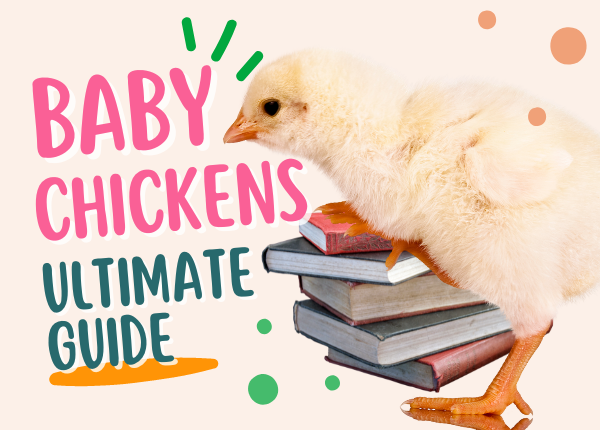
Congr-hatch-ulations! You’re getting egg babies! Eeeek, it’s so egg-citing isn’t it?
If you’ve decided to home your very own hatchlings, then you’re probably getting chick broody. Let me guess…You’re researching chickens into the wee small hours and boring your buddies with random chicken facts? That’s great! It means you’ll ace this because you care.
Bringing your baby chickens🐣 home for the first time can feel almost as daunting as leaving the maternity ward with a little human in a car seat.
“They’re so tiny! What if I drop them? Why are they making that weird noise? WHAT is that thing on their bum? Help!!”
You cannot bring baby chicks home without being prepared: they are counting on your care, research, and attention to survive their first six weeks, at least. You’ll be taking on the job of their mama hen, and mama hens are dedicated!
Before you jump in feathered feet first, make sure you know what you’re taking on with a quick read of my blog where you’ll learn all about baby chicken lingo, life cycles, and development milestones.
If you’ve been there, done that, and bought the ‘hell yeah, I want chicks’ T-shirt, then the next step is getting ready for your new roomies.
No blog in the world can tell you everything you need to know about raising baby chickens, that’s like looking for a single book that will help you raise the perfect kid. It’s not going to happen.
What you can do is prepare and plan as best you can. In fact, this should be your new mantra!
That’s where this blog comes in, answering all your before-I-buy chicken questions:
- What Do I Need to Buy for Baby Chickens?
- Which Chicken Feed is Best for Baby Chickens?
- How Much Food Do Baby Chickens Need?
- What Can I Give My Baby Chicken for a Treat?
- How Many Treats Should I Give a Baby Chicken?
- Which Feeders Are Best for Baby Chickens?
- Do Baby Chickens Need Grit?
- Which Waterers Are Best for Baby Chickens?
- Why Do People Give Baby Chickens Apple Cider Vinegar?
- Are Baby Chickens Smelly?
- How Often Do Baby Chickens Need Cleaning Out?
- Where Should I Keep My Brooder Box?
- What Temperature Is Best for Baby Chickens?
- Do Baby Chickens Need Roost Bars?
- When Can Baby Chickens Leave the Brooder?
- When Should I Introduce New Chicks to My Chickens?
- What Do I Do if a Chick Gets Sick?
- What Goes into a Chicken First Aid Kit?
- How To Pick a Healthy Baby Chicken
- How Do I Know if I’m Buying a Male or Female Chick?
- What are Auto Sexing Chickens?
- What are Sex-Linked Chickens?
What Do I Need to Buy for Baby Chickens?
A shopping trip is on the cards! If you don’t already have chickens, then you’ll need to start looking for the right chicken coop and other big-bird products soon, but for the first 4-6 weeks you’ll need…
1. Brooder
This is a safe home for your baby chickens. There are loads of size and design options to pick from, and depending on how many chicks you have, you’ll need to make sure you have space for them all.
2. Heat Lamp or Plate
Until chicks are 8 weeks old and have their feathers, they need help to stay warm.
3. Litter/Bedding
Pine shavings or hemp bedding are the best options for those fragile little fluffballs. Line the brood box with about an inch of the litter so there are no slips and it’s easy to keep clean.
4. Waterer
A bowl of water is a slip-and-drown risk for teeny chicks, and you’re guaranteed knocks and spills. A hanging waterer is the best fix.
5. Feeder
Picking the right feeder will help avoid bacterial infections and minimize the housework.
6. Thermometer
Chicks are incredibly sensitive to temperature shifts, and maintaining the right temperature is critical in keeping chicks safe and well. The optimal temperature for chicks changes week by week as they grow, so get yourself a chart at the ready!
7. Chicken Starter Feed
The right starter feed is the only food you have to have for your baby chicks for the first 6 weeks, though it’s nice to enrich their diet with treats, they’ll be okay without them.
8. Grit
Once chicks start eating treats, they’ll need grit to help them digest larger foods.
9. Treats
Some yummy😋 ideas (honestly) are dried mealworms, oats, carrot, eggs, and crushed maize.
10. Kitchen Towel & Cleaning Products
You will be cleaning up after your little darlings. Get your cleaning kit ready.
11. Apple Cider Vinegar
This stuff is so good for baby chickens! You don’t have to have it, but you’d be crazy not to for the sake of a few dollars.
“Apple Cider Vinegar is chock-a-block full of good-for-the-gut elements that will boost your babies’ digestive and immune systems.” (Chickenpedia’s baby chicken course)
Which Chicken Feed is Best for Baby Chickens?
Starter feed is baby food for chickens. There are different chicken feeds available for different stages in a chicken’s life, just like how you buy puppy food, adult dog food, and senior dog food.
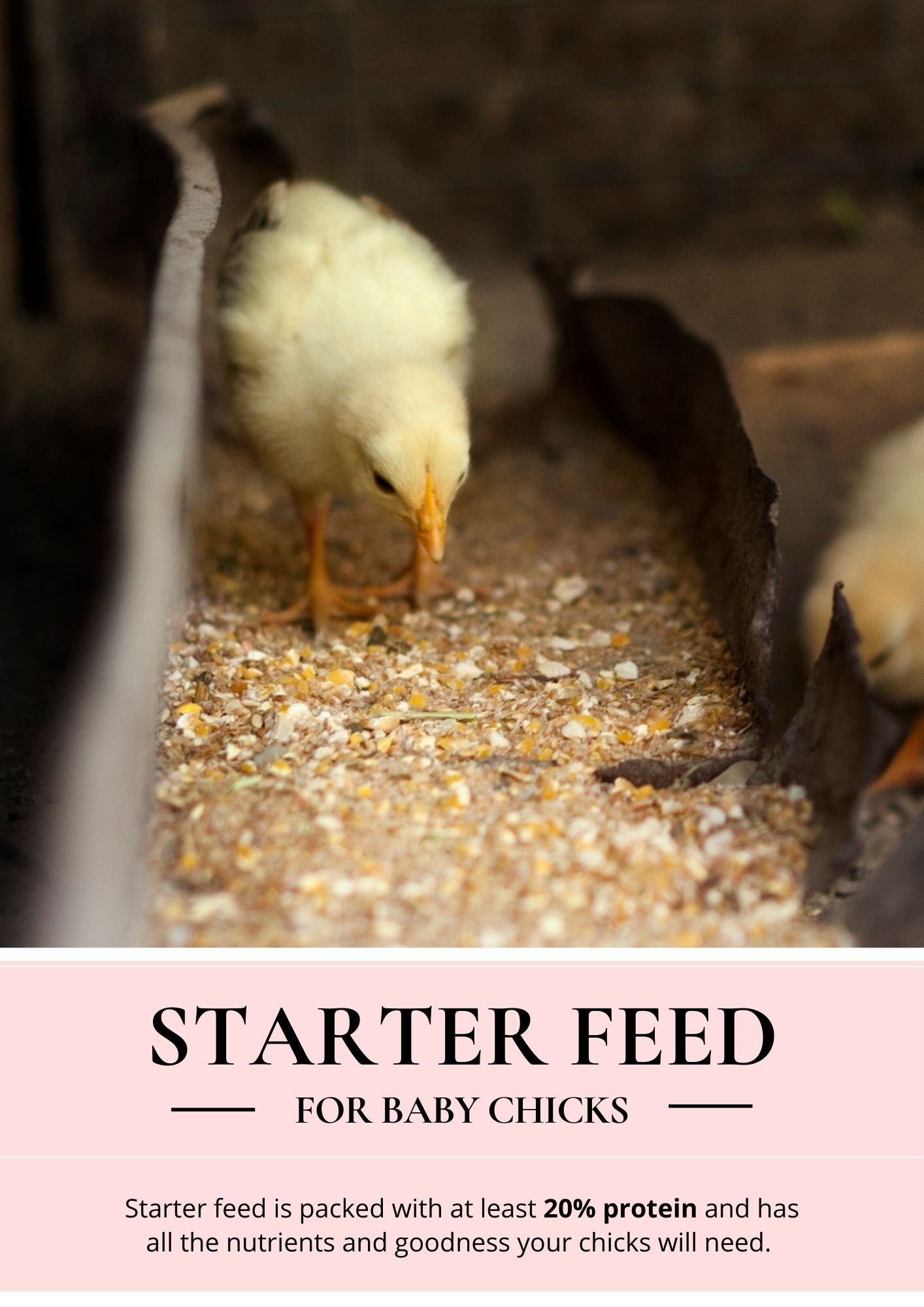
Starter feed is packed with at least 20% protein and has all the nutrients and goodness your chicks will need. They can live happily with just starter feed and water until 6 weeks old when you’ll need to move to grower feed.
Grower feed has a little less protein than starter feed (16 – 18%), but it has less calcium than layer feed as your teenage chickens won’t need too much of that stuff yet.
How Much Food Do Baby Chickens Need?
Baby chickens need however much food they can eat. You can’t overfeed a chick with starter feed, so keep their feeders full of fresh feed by topping up a few times a day. Don’t be tempted to dump a mass of feed and leave it unchecked though, it’s important to scoop the poop regally.
Yeah. They will poo in their feed. Dirty little devils.
What Treats Can I Give to Baby Chickens?
It’s best not to treat your peeps until they’re a week old. Let them get the acquire a taste for the good stuff before they decide they’d rather live off sugary snacks.
When your chicks are all grown up and have moved out of the brood box (weep) they’ll find their own goodies by pecking and scratching around the garden.
Whilst they’re in the brood box, you can treat them with mealworms, oats, shredded carrot, green leaves, and occasionally fruit (it’s sugary!)
Chicks love watermelon when they’re warm, and oats softened with warm water are great when it’s chilly.
How Many Treats Should I Give a Baby Chicken?
Don’t give in to those eyes. You’re in charge of their diet. No matter how much they nag you for treats – which they will – make sure their starter feed is at least 90% of their daily diet.
Balancing your chicken’s diet is an important job, and it can be confusing with all the products on offer. Chickenpedia offers a great course that egg-splains the good, the bad (and the ugly) of chicken nutrition.
Which Feeders Are Best for Baby Chickens?
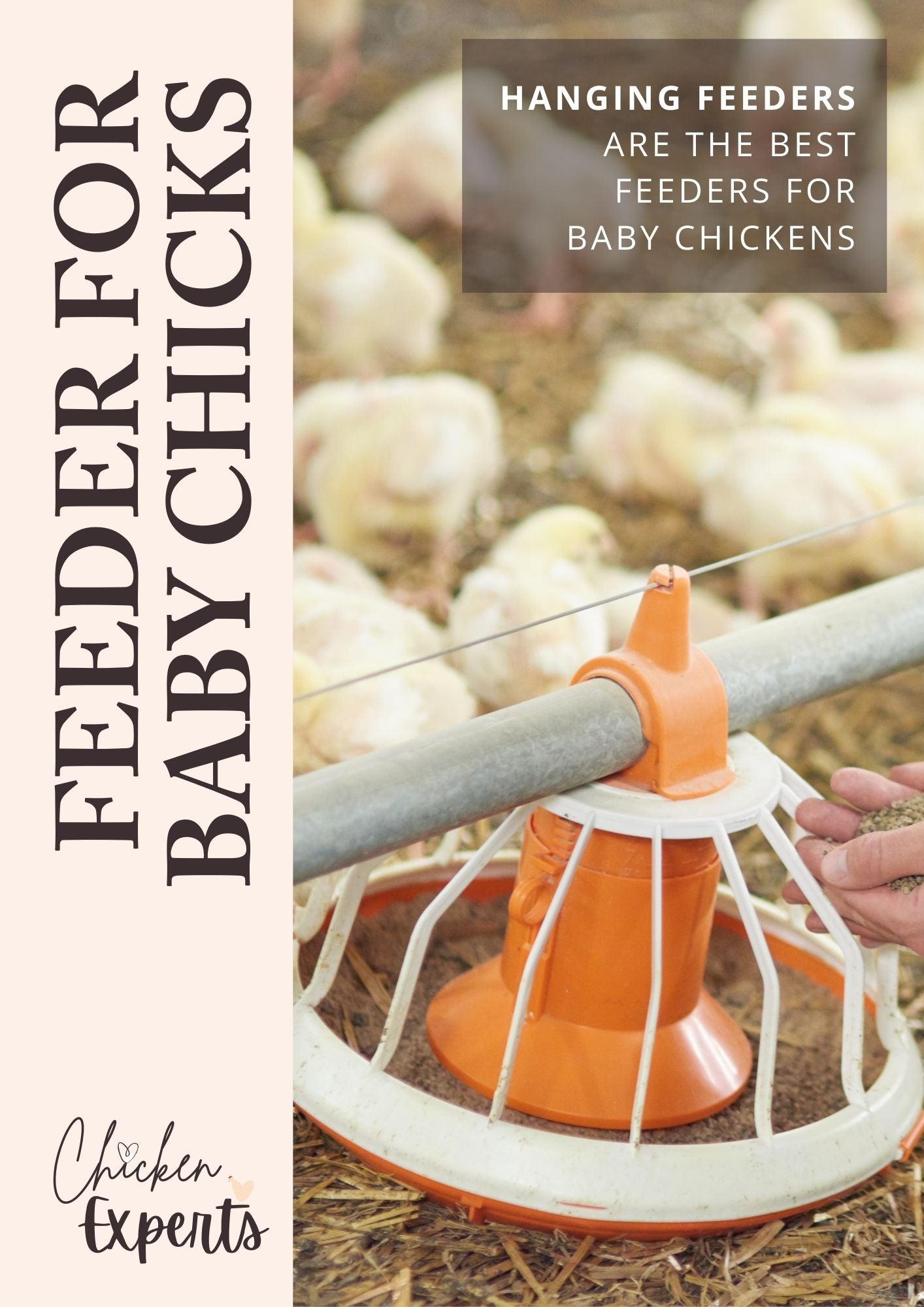
The best bet is a hanging feeder with small, shallow access holes. When your babies are bigger, they’ll have (slightly) better table manners and you can look at different designs, but baby chickens are messy! They’ll knock food everywhere if it’s at ground level and will 100% poop in it.
Even with jobs as simple as dishing up breakfast, baby chickens can throw up tricky situations. You’ll almost always have a battle of the bellies, and smaller or nervous chicks might be bullied away from their share of breakfast.
What if one chick isn’t eating up? Chickenpedia’s baby chicken course is full of top tips like letting weaker chicks eat first before letting the bigger kids join the dinner table.
Do Baby Chickens Need Grit?
Chickens need grit to do the job of teeth – which they don’t have. They’ll take in sand, gravel, shell, or pebbles as they peck and forage and this grinds down their food in their gizzard. We’re not talking rocks and boulders here, just the soil on a lettuce leaf acts as grit.
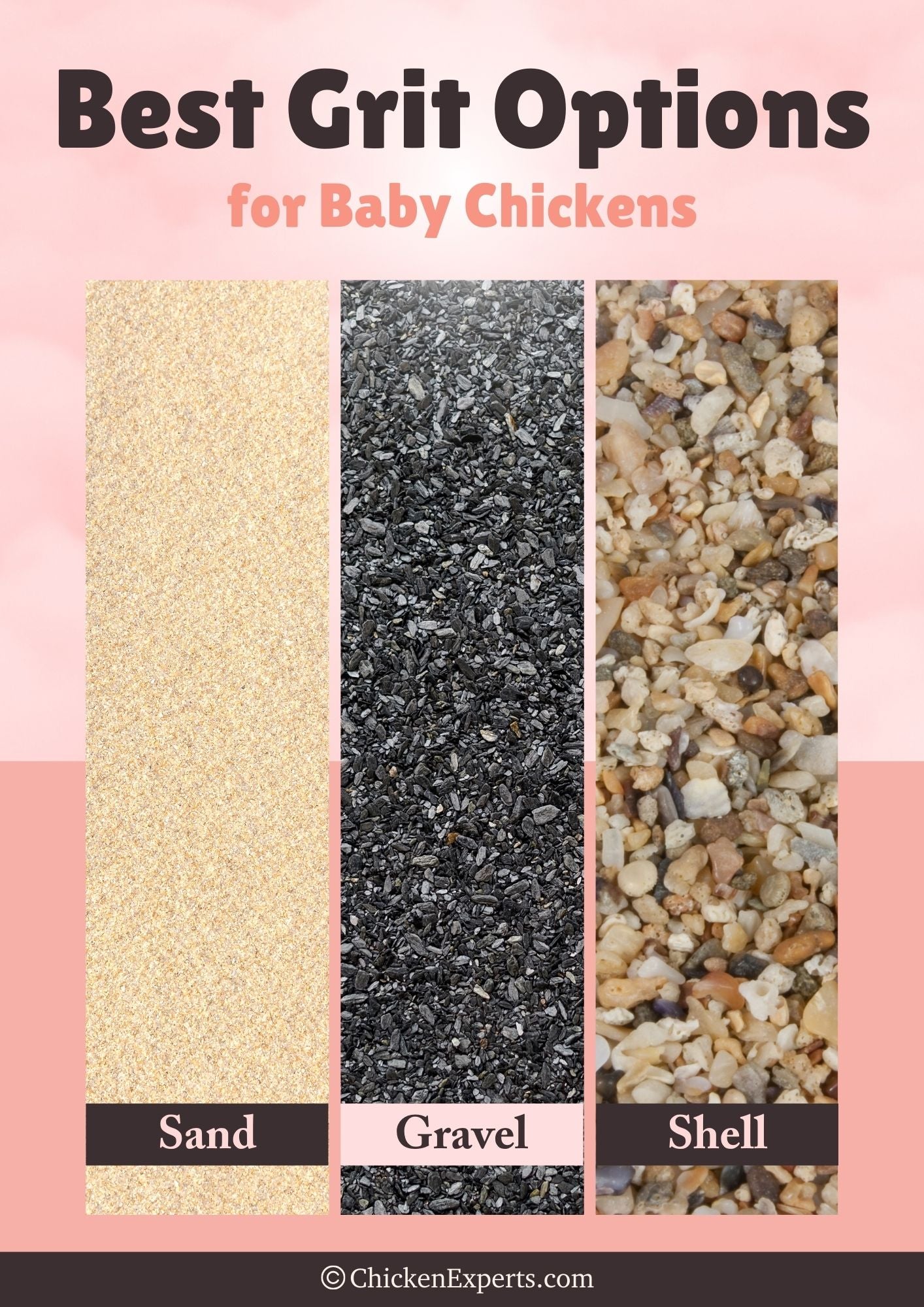
Baby chickens don’t need grit if you’re only feeding them starter feed, but once you introduce treats, they’ll need fine grit, like sand, to help them digest their feed and avoid impacted crops or other digestive issues.
Which Waterers Are Best for Baby Chickens?
Unlimited access to fresh water is REALLY important for baby chickens. Just like with their food, they’ll pee and poop in a water bowl, and worse, they’re known to slip and drown in them.
The best bit of kit you can get for the job is a raised waterer with a nipple that they can peck at to release water, like a hamster’s water bottle. It might look funny in your mind (they’re chickens, not sheep?) but they’ll learn to use it quickly and their water will stay clean and fresh for longer.
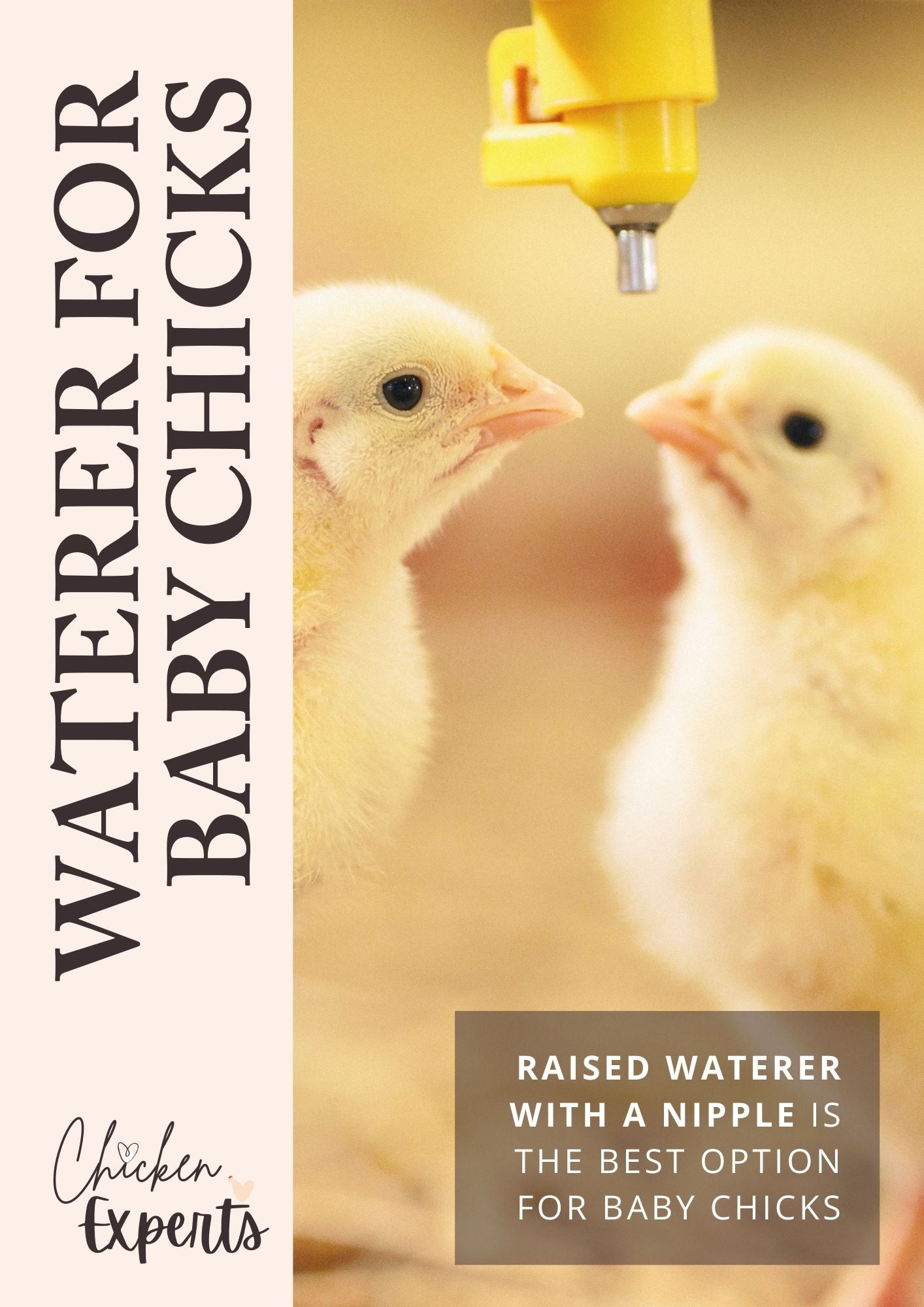
Why Do People Give Baby Chickens Apple Cider Vinegar?
Apple Cider Vinegar encourages the growth of beneficial bacteria and yeasts in a chick’s intestines because they prefer acidic conditions.
Chicks raised in an incubator gain their gut flora more slowly than chicks that grow nuzzled into their mum, so Apple Cider Vinegar helps speed things up here.
Are Baby Chickens Smelly?
I could lie to you, but I won’t. Fowl can smell foul!
If you keep your brooder clean, you’ll reduce the stink and the risk of bacteria. It’s not just the poop that needs to be scooped. Bedding that’s damp from water spills around the feeder might look innocent enough, but that warm, damp bedding is like the Hilton for bacteria like Coccidia.
How Often Do Baby Chickens Need Cleaning Out?
Clean out your brooder at least every three days, and more often if you have lots of chicks or they’re messy little monkeys.
You do need to be careful about the way you clean your brood box, the products you use, and what you do with the residents whilst you’re spring cleaning. Chickenpedia recommends using an ammonia-free disinfectant.
Where Should I Keep My Brooder Box?
Your brooder box can go anywhere warm, dry, and safe. They need to be protected from the weather and predators, and you’ll want to be able to check on them often and easily, so spare rooms and adjoining garages (if kept free of fumes) are popular choices.
What Temperature Is Best for Baby Chickens?
Baby chickens🐣 are super sensitive to changes in temperature, and vulnerable if they get too hot or cold. Managing your chicks' temperature is non-negotiable.
You’ll need a heat lamp or heat plate, and a thermometer to independently check the brooder.
Start your brooder temperature at 35°C and reduce it slightly each week until the brooder temperature is the same as the ambient room temperature.
“The best way to regulate the temperature in a brooder is with a heating pad or plate. This is less dangerous than a lamp as it isn’t a fire risk.” (Chickenpedia baby chicken course)
Peck out the Chickenpedia baby chicken course for week-by-week guidance on temperature management, tips on how to position your heat plate, and how to tell if your chicks are too hot or too cold…they can’t tell you!
Do Baby Chickens Need Roost Bars?
Baby chickens don’t need roost bars, but they’re great for their development. Learning to hop on and off a low roost bar is great for your fluffbomb’s balance and muscle development, and it’s fun!
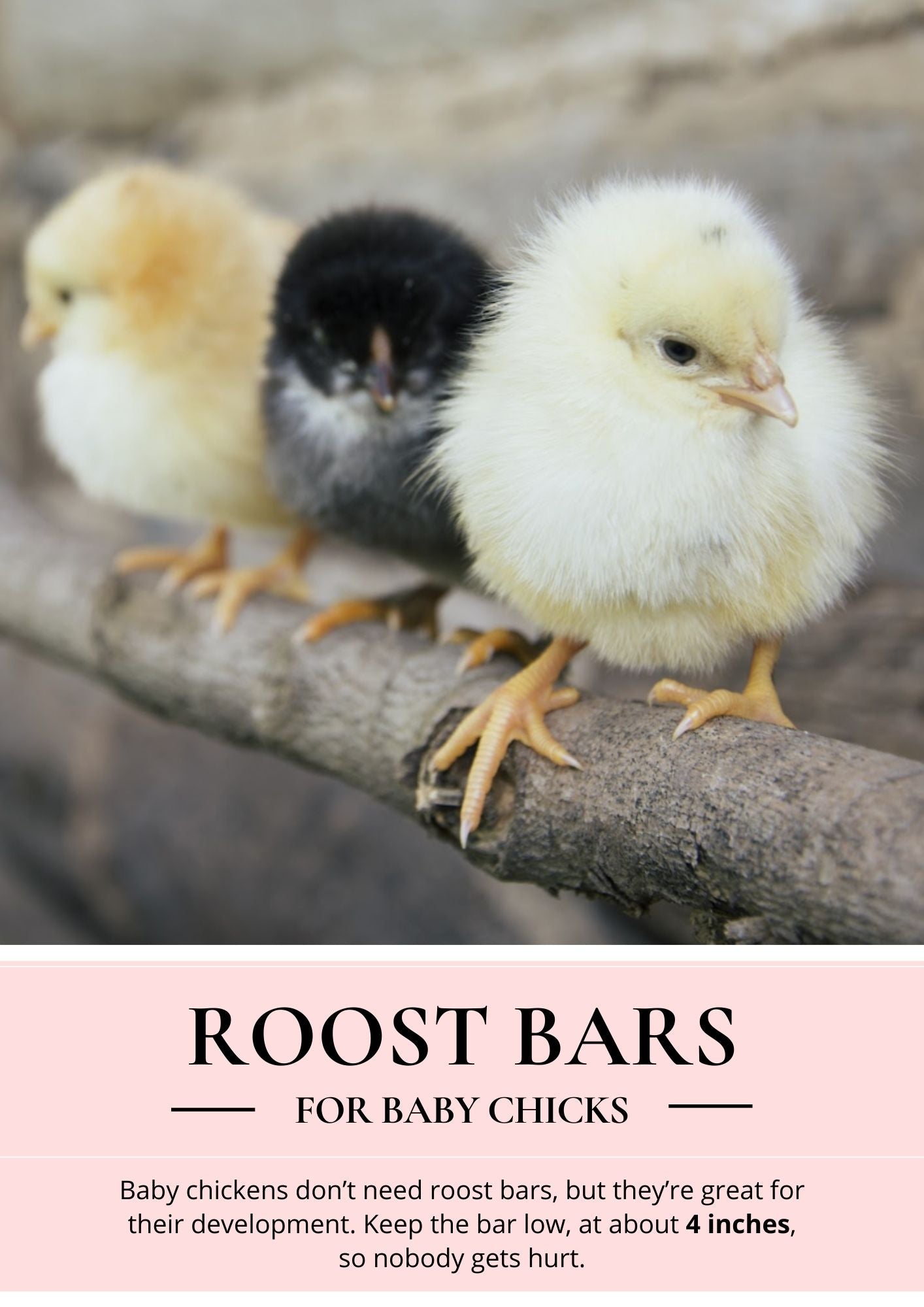
If I’m honest, watching their bloopers as they practice can be hilarious. Keep the bar low, at about 4-inches, so nobody gets hurt.
When Can Baby Chickens Leave the Brooder?
Once your chicks are 6 weeks old, they should be ready to leave the brooder.
They’ll need to be fully feathered and go through a period of acclimatizing to a slightly chillier life away from the heat lamp. Don’t tackle this on the coldest day of the year, or if they have any health issues.
Get ready for those mixed emotions. They don’t need to be inside with you anymore, but they’re still your babies and you’re worried the big kids will be mean…
When Should I Introduce New Chicks to My Chickens?
New chicks should be fully integrated and move into the coop at 10-12 weeks old.
When your chicks are 4 weeks old you can start socializing them with their soon-to-be coop buddies. Strictly no contact to start with, and as your babies will need to get back to the brooder introductions need to happen at a safe distance and in a warm environment. If you can wait until they’re out of the brooder it will make it all a lot easier.
The process of evicting your chicks can feel daunting and the first day at school can turn the most chilled-out chicken keeper into a helicopter poultry parent.
What Do I Do if a Chick Gets Sick?
One of the toughest parts of keeping chicks is that sometimes they do get poorly. Sometimes, worse. It’s not something we like to think about, but having a plan, or knowing where to turn if something sad does happen, will help you manage the tougher life lessons of raising chicks.
If you have kids along for the journey, being prepared and grounded rather than shocked and panicked can help them learn this lesson with a more grounded understanding.
Some first-time chicken keepers leave deceased chicks with their brood-mates for a while whilst they research what to do, thinking their siblings can say goodbye. Taking a course before bringing home your fluff babies will help you act quickly when it counts.
“The first thing to do would be to remove the body as soon as you discover it. The next would be to determine the cause of death as some chick diseases and illnesses spread quickly through a flock and may be affecting some of your other babies as well. Once you’ve removed the body, it is important to thoroughly clean the brooder and disinfect it with an ammonia-free cleaner.” (Chickenpedia’s baby chicken course)
What Goes into a Chicken First Aid Kit?
The last thing you want to be doing when you have a chicken ouchie is scrambling around in like a stressy mess looking for ‘that thing’ that was ‘just there'.
A chicken first-aid kit is an eggy equivalent to a nappy bag. Have it at the ready all the time.
This First-Aid Kit List is just one of the chick-life lists, downloads, tips, and ideas available as part of Chickenpedia’s baby chicken course:
- Rubber Bands
- Duct Tape
- A Straw
- Cardboard
- An Eye Dropper
- A Plastic Syringe Without A Needle
- Cotton Wool
- Petroleum Jelly
- Hair Dryer
- Towel
How To Pick a Healthy Baby Chicken
When you’re looking at baby chickens there are a few signs to look out for to make sure you have the best odds of a good egg.
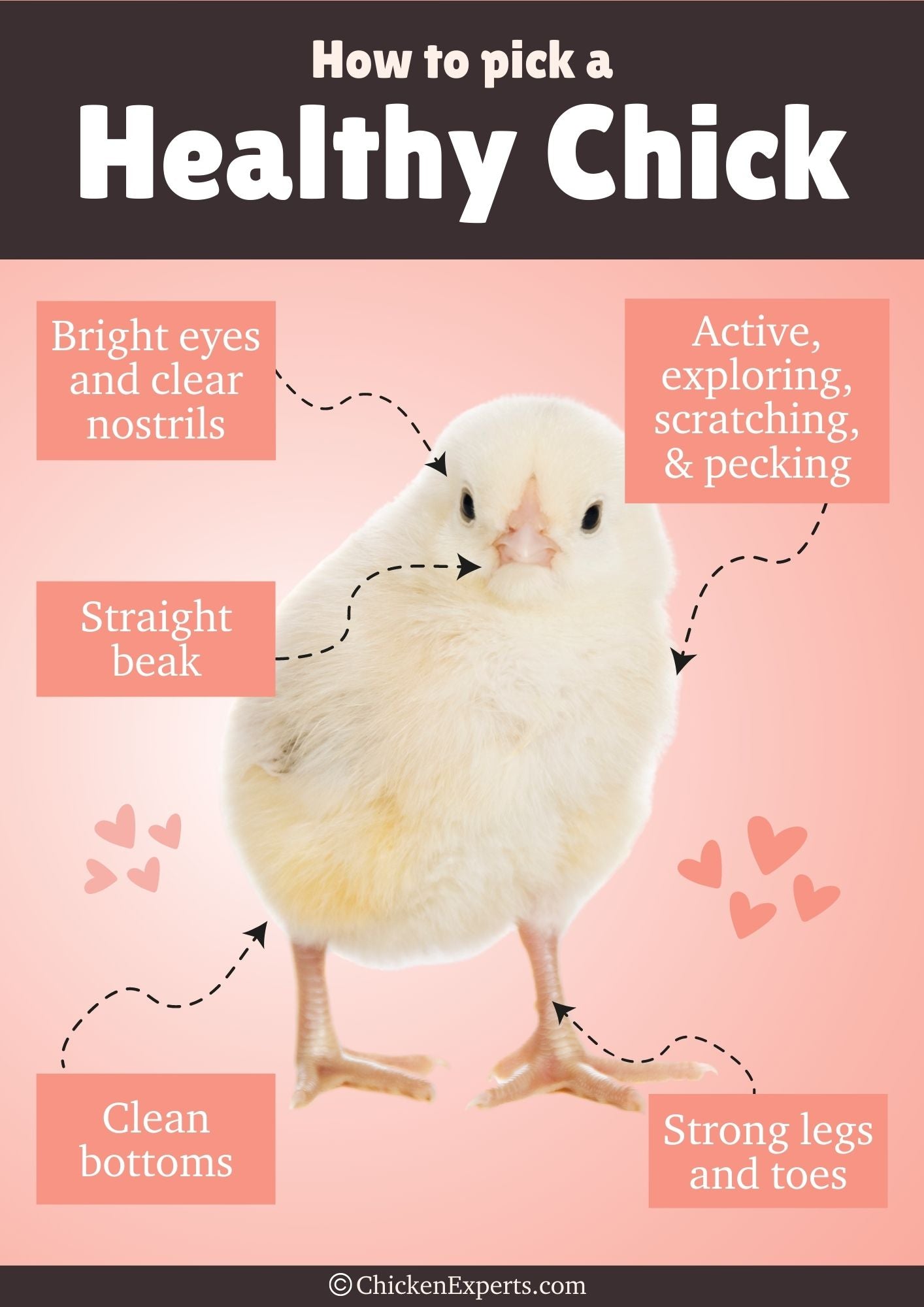
- Healthy babies should be busy babies: active, exploring, scratching, and pecking.
- Healthy chicks should have clean, bright eyes and clear nostrils: no discharge.
- Healthy chickens should have straight beaks where the two halves fit neatly on top of one another.
- Healthy chicks should have strong legs and toes, all present and correct.
- Birdy bottoms should be clean. Maybe not squeaky clean because they’re babies after all, but not overly dirty.
How Do I Know if I’m Buying a Male or Female Chick?
The only way to know if you’re homing a future hen or cock is to invest in DNA or vent sexing. Both take time and money and require an expert. Unless that is, you are shopping for chicken breeds that are auto sexing or sex-linked:
What are Auto Sexing Chickens?
Auto-sexing chicks can be sexed from day one, as males and females have different color patterns. Welsummers and Cream Leg Bars are eggs-amples of these considerate chicken breeds.
What are Sex-Linked Chickens?
Sex-Linked chicken breeds can also be sexed from day 1, but because we’ve designed them that way! Most are made by crossing 2 chicken breeds with known color characteristics make this possible. They tend to be bred for laying so are usually the same breeds that you’ll recognize as great egg layers like Isa Brown and Golden Comets.
Nothing can prepare you for parenthood, or poultryhood. You can, and should, prepare as best you can, but something will pop up that you couldn’t predict.
At least one of your chicks will scare the life out of you playing dead, or there will be something crawling in its poop. Your chicks will squabble, you’ll be convinced one has issues, or you’ll be intrigued by a new behavior trait.
You will always have questions and worries because that’s what parenting does to people, but we wouldn’t want it any other way.
As you might have guessed, I would recommend looking into Chickenpedia as a chicken-keeping…well…encyclopedia.
The courses are designed to be bite-sized and digestible – much like starter feed! You can complete the course in sections and revisit, revise, or reconvene your course when it works for you.
You’ll find great tips on things you didn’t know you needed to research like what to do if one of the chicks in the brooder dies, go-to-guides like the week-by-week to-do lists for raising your chicks and have access to lots of useful downloads. You’ll find out which diseases are most common in baby chickens, how to prevent them, spot the signs, and treat them.
Don’t wing it alone.











Leave a comment (all fields required)